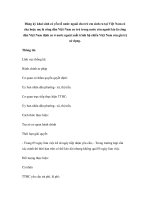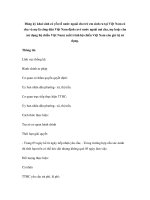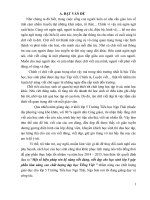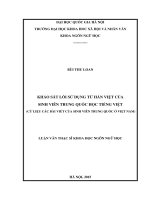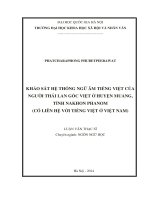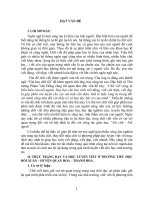Tài liệu Tiếng Anh ôn tập Ngữ Pháp Và Viết
Bạn đang xem bản rút gọn của tài liệu. Xem và tải ngay bản đầy đủ của tài liệu tại đây (60.54 MB, 183 trang )
& PRACTICE
Nick Brieger & Simon Sweeney
@ POWERED BY COBUILD
Contents
Introduction u
Grammatical Terms
vi
Grammar
Language Form
Unit 1 Be (1) am/s/are 2
4
Unit 2. Be [2] was/were/have been
Verbs - Main Tenses
Unit 3. The Present Continuous Positive / am working. 6
Unit 4 The Present Continuous Negative / am not working. 8
Unit 5 The Present Continuous Question Are you working? 10
Unit 6 The Present Simple Positive / work. 12
Unit 7 The Present Simple Negative / don't work. 14
Unit 8 The Present Simple Question Do you work? 16
Unit? The Present Continuous vs. The Present Simple / am working/I work. 18
Unit 10 Positive and Negative Imperatives Work. Don't work. 20
Unit 11 The Past Simple Positive / worked. 22
Unit 12 The Past Simple Negative / didn’t work. 24
Unit 13 The Past Simple Question Did you work? 26
Unit 14 The Past Continuous / was working. 28
Unit 15 The Present Perfect Simple / have worked. 30
Unit 16 The Present Perfect Continuous / have been working. 32
Unit 17 The Present Perfect with For, Since, Ever and Never / have worked for/since ... 34
Unit 18 The Past Simple vs. The Present Perfect Simple / worked/I have worked. 36
Unit 19 The Past Perfect / had worked. 38
Unit 20 The Present Tenses and The Past Tenses / work, ! am working, | worked, | have worked. 40
Unit 21 The Future with Will and Shall / wil//shall work. 42
Unit 22 The Future with Going To vs. Present Continuous / am going to work/I am working. 44
Unit 23 The Future with Will vs. Going To vs. Present Continuous
! will work/I am going to work/I am working. 46
Unit 24 Conditional | /f/ work, | will... 48
Unit 25 Conditional Il /f / worked, / would... 90
Unit 26 Tense Review 1 52
Unit 27 Tense Review 2 54
Verbs - Other Forms
Unit 28 Infinitive + To fo make 56
Unit 29 Verb ...ing making 58
Unit 30 Infinitive + To or Verb ...ing to make or making 60
Verbs - Auxiliaries and Modals
Unit 31 Do 62
Unit 32 Will and Would wil//would work 64
Unit 33. May and Might may/might work 66
Unit 34 Can and Could can/could work 68
Unit 35 Must, Have To and Have Got To must/have to/have got to work 70
Unit 36 Mustn’t, Needn’t, Don’t Have To and Haven't Got To mustn't/needn't work 72
Unit 37 Should and Ought To should/ought to work 74
Unit 38 Question Tags 76
Verbs - Voice
Unit 39 Active / make. 78
Unit 40 Passive /t is made. 80
Unit 41 Active vs. Passive / make/It is made. 82
Verbs - Other
Unit 42 It Is/They Are vs. There Is/There Are 84
Unit 43 Have and Have Got 86
Unit 44 Get and Have Got 88
Unit 45 Say vs. Tell 90
92
Unit 46 Make vs. Do 94
Unit 47 Used To 96
Unit 48 Rise vs. Raise
Unit 49 Verb + Preposition 98
Unit 50 Verb + Adverb (Phrasal Verb] 100
Sentence and Clause Types
Unit 51 Positive Statements / work for /TCorp. 102
Unit 52 Negative Statements / don’t work for ITCorp. 104
Unit 53 Questions: Yes/No Do you work? 106
Unit 54 Questions: Wh- Where do you work? 108
Unit 55 Questions: How How long have you worked? 110
Unit 56 Commands - Positive and Negative Make it/Don’t make it. 112
Unit 57 Sentence Types: Simple vs. Complex / work for IICorp and | live near the factory. 114
Unit 58 Subordinate Clauses /f/ work, / will... 116
Unit 59 Relative Clauses with Who and Which / work for a boss who... 118
Unit 60 Clauses of Cause or Reason with Because / work because ... 120
Nouns
Unit 61 Singular and Plural Nouns machine, machines 122
Unit 62 Countable and Uncountable Nouns machine, machinery 124
Unit 63 Noun Compounds company personnel 126
Unit 64 Genitive Forms the company’s, of the company 128
Adjectives and Adverbs
Unit 65 Adjectives vs. Adverbs quick/quickly 130
Unit 66 Comparison of Adjectives quick, quicker, quickest T92
Unit 67 Adverbs quickly 134
Unit 68 Expressions of Frequency always, never, etc. 136
Unit 69 Degree with Very, Too and Enough very/too quick 138
Unit 70 Already, Yet, Again and Still / have already done it. 140
Determiners
Unit 71 Articles the company, a company 142
Unit 72 Personal Pronouns /, me, you, he, him, etc. 144
Unit 73 Possessive and Reflexive Pronouns my/your/his/our company 146
Unit 74 Demonstratives this/that company 148
Unit 75 Some and Any some/any products 150
Unit 76 Some, Any and Related Words someone, somewhere, etc. 152
Unit 77 Quantifiers (1) al//several/a lot of products 154
Unit 78 Quantifiers (2) many/a] few details, much/{a] little information 156
Unit 79 Quantifiers (3) each/every company 158
Unit 80 Numerals 160
Prepositions 162
Unit 81 Time in at on
Unit 82 Place (1) at, to, from, in, into, out of, on 164
Unit 83 Place (2) above, below, etc. 166
Unit 84 Like, As, The Same As and Different From 168
Business Files 170
1 Industries and Jobs 171
2 Countries and Currencies 1/2
3 Business Abbreviations and Short Forms 173
4 British English vs. American English
5 Numbers, Dates and Times 174
6 Irregular Verb Table 175
Answer Key 176
Index 201
Introduction
Targets and objectives
Business Grammar & Practice: Pre-Intermediate is for pre-intermediate to intermediate speakers
of English who need to master the type of English used in professional situations. Whether you are
studying to enter the workplace or already using English at work, accurate use of English grammar
will make you a more effective communicator. If you feel you already know the core grammar for
business English, the Intermediate book in this series will take you through more complex grammar.
To ensure that the language you learn is relevant for the workplace, the book uses example
sentences from the Collins corpus. This is a constantly updated database of English language
from a range of print and spoken sources. You can therefore be sure that any example used is an
authentic use of English in a business context.
Business Grammar & Practice: Pre-Intermediate can be used together with any business English
course book to provide more detailed explanations and supplementary exercises in the grammar of
business English. It is suitable for both classroom and self-study use.
Organisation of material
There are 84 units and 6 Business Files.
Each unit consists of: forms in use;
1. Language presentation through:
¢ sample sentences to show the language
e an explanation of the language forms;
e adescription of the uses of these forms.
2. Practice through:
* controlled exercises to develop recognition of the language forms (Exercise 1};
* controlled exercises to practise combining language form and language use {Exercise 2);
¢ controlled or guided exercises focusing on language form and meaning [Exercise 3];
* transfer activities to practise transferring the language presented in the unit to the student's
own personal and professional experience.
3. Answers to the controlled and guided exercises.
You should work through the presentation by:
* reading through the sample sentences and noting the use of the language forms [Section A);
s studying the language forms presented (Section B);
e studying the uses of these forms [Section C].
Next you should move on to the practice exercises. There are three types of exercises: controlled,
guided and transfer.
Before you start an exercise: if necessary.
e make sure you clearly understand the task;
e look at any examples that have been given;
s refer back to the language forms and uses,
After you have finished a controlled or guided exercise, check your answer with the key at the back
of the book.
Controlled exercises have only one possible solution; guided exercises have a model or suggested
answer marked [M]. If your answers to a controlled exercise are wrong, look again at sections B and
C. If your answers to a guided exercise are different from those suggested, check if your answers are
possible alternatives.
Finally, a few words about the transfer activities: the reason for including these is that they act as
a bridge to your world by providing an opportunity to transfer to your own personal situation the
language presented and practised in the previous exercises.
Key Grammatical Concepts
It is important to know the names of the main grammatical terms and forms in order to use this
book. It is also important to think about the corresponding forms in your own language. In the
following section, you can find out information about the grammatical terms you will need to know.
Grammatical Terms
Active (see also Passive and Voice] Determiner
A verb or verb phrase which has the person or thing A class of words which includes articles, possessive
doing the action as its subject, e.g. The government pronouns, demonstratives and quantifiers.
increased taxes.
Doer
Adjective The person who does the action in a passive
An adjective gives more information about a noun, sentence. The doer has the word ‘by’ before it, e.g.
e.g. a successful company, huae profits. An adjective The mistake was discovered by the accountant.
can also be used after the verb be, e.g. the company
is successful, profits are huge. Expression (see also Clause and Sentence!)
A group of words, e.g. last week, in the company.
Adverb
An adverb gives more information about a verb, Future
e.g. The company grew quickly. The time that happens after now or one of the
grammar forms that expresses the time after now,
Article a/an which are used before a noun, e.g. We are going to buy the company. | am leaving
The words the or a desk, or the zero article e.g. tomorrow morning. The meeting starts at 9 o'clock.
e.g. the manager,
subsidiaries Genitive shows
A noun written with an apostrophe which the
Auxiliary verb possession or a similar relationship, e.g. countries’
The verbs be, have and do when they are used with manager's decision, last year's results, the
other verbs: economies.
- continuous verbs {be], e.g. Sales are increasing. Grammar
- passive verbs [be], e.g. The factory was sold
Grammar describes the forms of words, e.g. sell,
last year.
sells, or selling. It also determines the way words
- the perfect (have and had], e.g. We have can be combined to make phrases, e.g. /s selling;
already placed an order. must have sold; employment agency, and the way
words can be arranged into larger units of meaning,
- negative and interrogative verbs (do], e.g. We e.g. The store has sold all its stock.
don't agree with the plan. What do you think?
Imperative
Cardinal number (see also Ordinal number] The verb form when you are telling someone to do
The numbers 7, 2, 3, 4, 5, 6, etc. something, e.g. Prepare the report. Call the supplier.
Indefinite article {see Article)
Clause subject
A group of words containing a minimum of a Indefinite frequency (see also Definite frequency]
and verb, e.g. / wrote the report. An expression showing approximately how often
Command something happens, e.g. always, often, sometimes,
A command tells someone to do something, rarely, never etc.
e.g. Prepare the report. Call the supplier.
Comparative [see Comparison of adjectives] Infinitive
The base form of a verb without ‘to’, e.g. be, make, write.
Comparison of adjectives
The three forms of an adjective, i.e. high - higher Infinitive + to
The base form of a verb with ‘to’, e.g. to be, to make,
[comparative] ~- highest (superlative), or expensive - to write.
more expensive — most expensive
Conjunction Intransitive verb (See also Transitive verb)
A word which links words, phrases or clauses, e.g. A verb which cannot take a direct object, e.g. Costs
but, and, because. rose by 5 per cent last year.
Consonant Irregular verb
One of these letters: b, c, d, í,g,h, j, k, Lm,n,p, q, ", A verb that does not form the past tense and
S,f,V,W,X,V,Z. the past participle by adding -ed, e.g.
come - came - come, buy - bought - bought.
Continuous [aspect]
Main clause (see also Subordinate clause]
A verb construction in the form be + infinitive. ..ing, A group of words with a subject and a verb which can
be a sentence, e.g. We sold the company.
e.g. is working.
Countable noun (see Noun) Main verb
Definite article (see Article] A verb which is neither a modal nor an auxiliary
verb. Be, have and do can be main verbs or auxiliary
Definite frequency verbs depending on their use.
A phrase that tells us exactly how often something
happens in a period of time, e.g. every day, twice a year.
Demonstrative Modal verb
The words this, that, these and those when they are These verbs and their negative forms are modals:
used in a noun phrase, e.g. This email is from James. will, can, shall, may, must, would, could, should, might
vi Pre-Intermediate Business Grammar
Modals are followed by an infinitive, e.g. You must Regular verb (see also Irregular verb)
attend the meeting. A verb that forms the past tense and past participle
Needh † and daren† are also used in this way. by adding -ed, e.g. start - started - started.
Noun Relative clause
A word that names persons, places or things, A clause beginning with a relative pronoun such as
e.g. manager, factory, computer. who, whose, which, that or a relative adverb such as
A countable noun is a noun with a singular and when, where, why.
plural form, e.g. a machine, 20 machines.
An uncountable noun is a noun that does not Sentence a subject and a verb between
have a plural and you cannot put a or an before it, A group of words with name is Paul. | come from
e.g. information, equipment. two full stops, e.g. My
A noun compound is a group of words with two or London.
more nouns, é€.g. sales director.
A noun phrase is phrase with a noun as the main Short form an
word, e.g. a very good manager. A short form of a verb that is written with missing,
apostrophe to show that some letters are
Object
A noun or noun phrase that is used after a transitive e.g. it's, we're, can't.
verb, e.g. We played golf
Simple
Ordinal number A verb construction in either the present simple or
The numbers ‘st, 2nd, 3rd, 4th, 5th, 6th etc. past simple tense.
Passive (see also Active and Voice) Simple sentence
A passive construction contains a verb or verb A sentence which is only one main clause, e.g. Sales
phrase in the form be + past participle, where the have increased.
doer of the action is expressed as the agent rather
than the subject, e.g. Taxes were increased by the Singular [see also Plural)
last government {passive] versus The last government A form of a noun, pronoun or verb which shows that
increased taxes {active]. there is only one, e.g. company, |, she lives in York.
Perfect (aspect) Subordinate clause {see also Main clause]
Averb construction in the form has/have + past A group of words with a subject and verb which is
participle which puts the action or event in a not a sentence because it needs a main clause to be
different time from the time of speaking or writing. complete, e.g. He worked for ITCorp before he joined
The present perfect shows that the action has been MeaaTech.
completed by the time of speaking or writing, e.g. We
have already seen the report. Subordinating conjunction
The past perfect shows that an action has been A word which introduces a subordinate clause, e.g.
completed by an earlier point of time, e.g. We had because, although, if, who.
already seen the report.
Superlative (see Comparison of adjectives)
Phrasal verb Tense
A verb phrase that consists of a verb + adverb, e.g. The grammatical form of a verb which shows
to look upa word [in a dictionary). the time of the action, e.g. present or past.
Time marker something happens,
A phrase which shows when next week.
Phrase e.g. last year, at the moment,
A group of words, but less than a clause,
containing a subject and verb. i.e. not Transitive verb (see also Intransitive verb)
Plural (see also Singular] shows that A main verb which takes a direct object, e.g. We
A form of a noun, pronoun or verb which they, profits played golf last week.
there are more than one, e.g. companies,
are increasing. Uncountable noun {see Noun]
Preposition Verb ...ing
A word that is used before a noun and shows us The verb form infinitive + ing, e.g. helping.
something about time, e.g. in the morning, at 7 o'clock,
place, e.g. on the desk, or manner, e.g. by car. Voice
The grammatical category of either active or passive
verb form.
Pronoun Vowel
A word that takes the place of a noun or noun One of the letters a, e, /, 0, u.
phrase, e.g. she, my, this, who.
Wh-question
Quantifier A question beginning with who, what, why etc or
A word which describes quantity, e.g. all, many, with how.
some, few, no.
Yes/no question
Question tag A question to which the answer must be yes or no,
A short question which makes statement into a e.g. /s your name Mary?
question, e.g. We sent the goods last week, didn’t we?
Zero article {see Article)
vii
UNIT Be(1)
1
Unit 2 Be (2)
A Sample sentences
A: Where are you from?
B : fam from Asciano. And my colleagues are from Pisa.
A I’m sorry. Where is Asciano?
B : It is in Tuscany. It’s near Siena.
The present tense of to be has three forms:
the positive, the negative and the question.
Positive form
B1) (3:
| am I'm
you're
you are he”s/she's/it's
the manager's
he/she/it is the company’s
we're
the manager is
they're
the company is the managers”re
the companies’re
we are
they are
the managers are
the companies | are
Note
The first seven short forms are used in spoken or informal written English;
the last two [the managers're etc.] are used in spoken language only.
Negative form Question form
K10bỉ
| am not
you/we/they are not are you/we/they?
he/she/it is not is he/she/it?
the manager/the company is not is the manager/the company?
the managers/the companies are not are the managers/the companies?
The negative short forms are:
I'm not, you aren't, he isn't, she isn’t, it isn’t, we aren’t, they aren't
Look at these sentences with the verb to be in different forms:
Questions Positive and negative forms
A: Are you from New York? B: No, I'm from Boston.
A: Excuse me. Is your name Billy Ray? B: No, it isn’t. I'm Millie Ray.
A: Am | inthe right place? Is this the room forthe B: Yes, itis.
sales meeting? B: They are in the US and Asia.
A: Where are the main markets for your products?
2 Pre-Intermediate Business Grammar
Zoe
In the dialogue below, Peter Hay is talking to Jane Field and Arnold Weiss at a trade fair. Put the
verb forms in sentences 1-14 into the correct box. The first one is done for you.
Present positive | Present negative | Present question
PH: Hello, I’m Peter Hay. [1] Where are you from? [2]
JF: |We're from Seattle in the USA. (3)
PH: 0h, are you American? (4)
JF: — | am. (5) But Arnold isn’t. (6)
AW: — I'm from Austria. (7) But we're from the same company, Inter Corp. (8)
PH: Oh, yes, Inter Corp. What are your names? (9)
JF: My name's Jane Field. {10) This is Arnold Weiss. (11]
PH: Pleased to meet you. Are you in banking? (12]
AW: No, we're not. [13] We're in insurance. [14]
Exercise 2
Complete the spaces. Use short forms where possible.
1. This is Dave King. _— He's— an engineer.
2. My names Pierre Lapin. — a
Sales Manager.
3. Mary and Hans are from my department.
computer programmers.
4. This is Naomi Cox.
a research scientist.
5. Hello. My name __— Franz Johann
and this _— Tomas Doll.
————_— from Salzburg.
6. Ah, Franz and Tomas!__ _—
very welcome!
7. This is our office. It — very big.
Exercise 3
Complete the following text about Axdal Electronics. Use a form of be.
Axdal leads the way
Axdal Electronics is. a world leader in control systems. We _ _ _ suppliers to the car
industry. Car manufacturers _ our only customers. We ____ also suppliers to
other industries. AE ____an international company. Our customers
Japan and Europe. Our Chief Executive — PaulAxdal We ____in the USA,
and business __ very good’, says Paul. _a family company
Transfer
Write short sentences about yourself and some friends. Use different present tense forms of be.
`UNIT Be (2)
Unit 1 Be [1]
A Sample sentences
A: Hello Raj. Where were you yesterday? A: | haven’t seen you all week!
B: | wasn’t in my office. | was at a meeting. B: I know. | have been very busy.
The verb to be has three main tenses: the present [see Unit 1], the past and the present perfect.
Look at the positive forms in the past and the present perfect.
Past Present perfect Verb s Short form
Subiect ng I've been
| was have been
Ị you've been
you were have been
you he’s been/she’s been/it’s been
he/she/it was has been the manager's been
the manager was he/she/it
the manager | has been the company’s been
the company was we've been
we were the company has been they've been
they were we
they have been the managers've been (spoken only]
the managers were the companies’ve been [spoken only)
the companies were the managers | have been
the companies |
have been
have been
In the negative we use not: Present perfect today.
They have not been here
Past | haven’t been to Spain.
| was not in the office yesterday.
You were not with a customer yesterday.
The negative short forms are:
| wasn’t, you weren't, he/she/it wasn’t, we weren't, they weren’t | haven't been,
you haven't been, he/she/it hasn't been, we haven't been, they haven't been
Now look at these question forms: Present perfect
Past Have you been to Switzerland?
Where were you yesterday? Has he been with a client?
Was Mr Brown with you?
Look at these sentences with the verb to be in different tenses and different forms:oo e >pO@mbMmP
Where were you yesterday? You weren’t in your office. (past question and negative]
| was in Bolton. (past positive]
Why were you in Bolton? (past question]
| was with a client. (past positive)
I'm sorry. Bolton? Where is Bolton? (present positive and question)
It is in the north of England, near Manchester. In the past it was a famous textile centre.
(present positive and past positive]
| haven't been to Manchester. But I’ve been to Liverpool.
(present perfect negative and positive]
| was in Liverpool last week. When were you there? (past positive and question]
| was there in January. (past positive]
4 | Pre-Intermediate Business Grammar
BExaerceisre 1 Put the verb
In the dialogue below, Henry Leer and Joe Fisher are in a hotel bar in Amsterdam.
forms in sentences 1-10 into the correct box.
HL: Have you been to Amsterdam before? [1]
JF: Yes, |'ve been here on business. (2] | was at the Telecommunications Fair in June. (3)
Were you here then? (4]
HL: No, | wasn’t. (5) | haven't been here before. (6] We were on holiday in June. (7)
JF: Where?
HL: Mexico. Have you been there? [8]
JF: — Yes, [ve been to Mexico. (9) | was there in March. (10)
Exercise 2 Delco Ltd.
Complete the letter below with words 16-20 East Mount Road, Lincoln LN3 5RT
from the box. 6 November.....
have not been was(2) Dear Mary,
were(3) have been Last week Tom and Paula here for a
meeting. It very useful. They
here for two days. We to Oslo in the last
few days. We there for a meeting with our
Norwegian colleagues. Arne Sillessen very
interested in our ideas. Until now, |
happy with the project. Now | am very optimistic.
See you next week.
Best wishes
a
Sandy Peet
Sandy Peel
xa
Complete the spaces in the email below. Use short forms where possible.
From: ipes3 @cc.uat.es 15:40
Sent: Mon 28 November
Subject: Short Bros
_ Dear Frances,
lam sorry | (not) at the meeting yesterday. | (not) in the office
this week. Tom and | in London. We ata Sales Conference. | __
very busy recently Short Brothers happy with the contract? they
in contact today?
Please contact me by email tomorrow.
Thanks
Juanito
Write a short paragraph about yourself and a local industry or institution. Use past tense and
present perfect forms of be.
UNIT The Present Continuous Positive
See also Be
Units 1,2 The present continuous negative
Unit 4 The present continuous question
The present continuous vs. the present simple
Unit 9
A Sample sentences
¢ At the moment 70% of consumers are using the Internet to buy things.
s Prasad is currently preparing a business plan.
¢ At present | am eating my lunch.
The present continuous positive has two parts:
the present tense of to be +i nfinitive ...ing
Long form cc ee Short farm
Subject + to be
Subject am presenting I'm presenting
are making
| is calling you're making
is
you is preparing he’s/she’s/it’s calling
are reading the company’s preparing
he/she/it department [= it) are meeting the manager's reading
the company/the boss [= he/she] are looking we're meeting
the manager/the are visiting you're looking
doing they're visiting
we are the companies're doing
discussing {spoken only}
you the managers’re discussing
{spoken only]
they
the companies/the departments
{= they]
the managers/the workers
{= they]
We often use the short forms in spoken language; we sometimes use them in informal
written language:
We’re planning a new product for this year. [spoken and written)
At the moment the company’s doing very well. (spoken)
We use the present continuous to talk about:
1. activities at or around the time of speaking:
They are building two nuclear power stations.
2. temporary activities in the pri esent:
Bella, what are you doing? | 'm reading a report.
Note
With C1 and 2, we can use the following expressions:
| at the/this moment currently at present now
but not
actually
6 | Pre-Intermediate Business Grammar
Lee
Look at the email below. Underline five present continuous forms.
Date: | 12 march 20...
To: | all staff |
From: [ Jenny Palmer |
Subject: _ John Bramwell leaving _ |
Dear All,
John Bramwell is leaving the company after 30 years. We are organising a collection to buy John a
present. Please see Janet in Room 40. Janet is planning a leaving party for John. At present, John is
recovering in hospital after an accident. He is hoping to return to work next month, but only until the
summer.
Best regards M u
Jenny Palmer
EEEEH
Here is part ofa telephone conversation. Complete the spaces with the correct form of the word in
brackets. Use short forms, where possible.
DL: Hello, Peter. Listen, | ‘m reading (read) your report. There's a problem on page 50.
PT: Okay, | __ — llooklat it right now. What's the problem?
DL: It says we ________ invest] $250,000 in research. That's wrong. It’s $25,000,
not $250,000.
PT: Okay !'ll change that.
DL: — Right. Remember, you _ {meet} Mr Lally and his colleagues today.
PT: Yes,lknow The—y—_— [come] here at 2.30.
DL: _ Fine. Good luck. See you tomorrow, then.
Exercise 3
Look at the graph below. It shows total company sales and sales for two products, A and B.
Write four sentences. Use the prompts below.
1. Total sales (go up). £ total sales
2. Product A [increase].
3. Product B (fall).
4. The company [stop] xin
production ofProductB fe
Transfer
Write four sentences about you, your friends or a local business or institution. Include phrases
from the box.
now at the moment currently at present
UNIT The Present Continuous Negative
See also The present continuous positive
Units 1, 2 The present continuous question
Unit 3 The present continuous vs. the present simple
Unit 5
Unit 9
A Sample sentences
¢ lam not working at the moment; | am looking for a job.
¢ The company is not growing quickly enough.
¢ Managers are not dealing with the issue at the moment.
The present continuous negative has three parts:
the present tense of to be + nat + infinitive ...ing
Long form Short form
Subject Infinitive ing | Subject + not+to.be
Ị am not presenting I'm not presenting,
you are not making you're not or you aren't making
he/she/it is not calling he’s not/she’s not/it’s not calling
or he isn’t/she isn’t/it isn’t calling
the organisation [= it} is not preparing the organisation isn’t preparing
the director (= he/she) is not reading the director isn’t reading
we are not meeting we're not or we aren't meeting
you are not looking you're not or you aren't looking
they are not visiting they're nat or they aren’t visiting
the teams [= they) are not doing the teams aren't doing
the employees (= they] are not discussing the employees aren't discussing
We use the present continuous to talk about:
1. activities at or around the time of speaking:
The company is not/The company isn’t investing enough to improve its network.
2. temporary activities in the present:
We are not starting/We aren’t starting the meeting yet because John isn’t here.
8 | Pre-Intermediate Business Grammar
TASKS
Look at the text below. Underline four present continuous negatives.
We are not increasing our prices this year. The market is not strong enough. We are
launching new products for the domestic market. Most of our products are selling well at
home. At present, we are not planning any new products for export. Sales are not
increasing in our export markets. The company is not expecting improved sales this year.
Se — `...
Exercise 2 where possible.
Write sentences with a present continuous negative. Use short forms,mơ m6 N
1. |/not visit/a customer/in Rome
I'm not visiting a customer in Rome.
. We/not spend/much time/in Milan
. The company/not look at/new markets in southern Europe
At the moment many companies/not invest/in new products
Our marketing experts/not change/our present sales strategy
You/not stay/in a hotel
Exercise 3
Make negative or positive sentences for pictures 1-4 below. Use the words in brackets.
3. {|
(at the moment/we/build/new production plant) (Mr Jackson/work hard/these days)
Transfer the present continuous tense, with some
Write six sentences about your current activities. Use
positive and some negative sentences.
UNIT The Present Continuous Question
9 Units 1, 2 Be continuous positive
Unit 3 The present continuous negative
Unit á The present continuous vs. the present simple
Unit 9 The present
Units 53, 54, 55 Questions
A Sample sentences
Yoshie: Henry, what are you doing?
Henry: I'm checking the figures. There is a mistake here. What is Janet doing?
Yoshie: She is calling a taxi for you. Are you leaving now?
Henry: Yes, but Janet is staying.
The present continuous question has two parts:
the present tense of to be + infinitive ...ing
We put the subject between part 1 and part 2:
Subjedi - lnfinitive ...ing
am | presenting?
are you making?
is he/she/it calling?
is the computer (= it] analysing?
is the consultant (= he/she] | reading?
are we meeting?
are you looking?
are they visiting?
are the specialists (= they) doing?
are the machines [= they] preparing?
We use the present continuous question to ask about:
1. activities at or around the time of speaking:
A: Why is he leaving the building?
B: Because he is going to a meeting.
2. temporary activities in the present:
A: What are you working on?
B: At the moment we are developing new processes to speed up production.
10 Pre-Intermediate Business Grammar
TASKS
Underline the mistakes in the following sentences. Then correct them.
1. Is vou working very hard? Are you working very hard?
2. At the moment they working with Poland?
3. Is Leo and Sam planning the conference together?
4. What you think about? ....
5. Is raining in Bangkok? PE a ere
Exercise 2
Make questions to complete the dialogue below. Use the words in brackets.
1. What's Mary doing ? She's telephoning Signor Fini.
(What/Mary/do?]
2 ? To invite him to the meeting on Friday.
(Why/call/him?]
3. ? To talk about the La Paz report.
(Why/we/have a meeting?]
4. ¬ ———————?Yes, lm stil working on ít.
(You/work on/the report now?]
5 (Anyone/help/you?] —— ? No, I'm doing it alone.
6. (Kim and James/come/to the meeting?) __? No, they aren't.
Exercise 3
Make questions for the pictures 1-4. Use the words in brackets.
2. [why/fire alarm/ring) 4. {why/oil/leak)
Transfer colleagues using the present continuous form.
Write five questions about your
11
UNIT The Present Simple Positive
6 Unit 7 The present simple negative
Unit 8 The present simple question
Unit 9 The present continuous vs. the present simple
A Sample sentences
e We always investigate a job applicant’s background.
e The manager normally has total responsibility for this process.
e Many people say they never eat breakfast.
se loften go to France.
The present simple positive has one part:
infinitive(s]
| make
you present
he/she/it department [= it] calls
the company/the boss (= he/she] prepares
the manager/the reads
we meet
you look
they visit
the companies/the departments (= they] | do
the managers/the workers [= they) discuss
We use the present simple to talk about:
1. a general or permanent activity:
| work for a research company.
The company makes frozen food for supermarkets.
We finish work at 2pm.
2. how often an activity is done:
We usually meet twice a year.
| play golf every week.
12 | Pre-Intermediate Business Grammar
TASKS
Exercise 1
Make sentences with the following words. See the example.
| live ina city.
—___ work new solutions.
You Live `
He/She makes si ˆ a lot for work.
We/You/They studies
foreign languages. |
The company develops
Our Research travel for a multinational company. |
better products. |
Department in a city. |
Exercise 2
Match the sentences below to the correct picture a-e.
1. In the evening | get the train home. 4. At 10 o'clock we have a meeting.
2. In the afternoon my PA gives 5. We usually have lunch with a customer.
me letters to sign.
3. At 8 o'clock | arrive at the office.
Exercise 3
Complete the following text. Use the words in brackets. Put the verbs in the present simple.
Atsuko Kyoto _— [live] in Tokyo. She. == — |beÌafreelance
journalist. She = [often/travel] to other countries. In London and Paris she
_— (like] to visif friends. She__———____— {usually/write] for newspapers
and magazines and she_. _ {sometimes/make] television programmes. She
——— Íusuall//stay} in four star hotelsand__—— loften/eat]in top
| class restauranfs. She__————_— [never/drink] wine, beer or any alcohol.
Write a short paragraph like the one in Exercise 3 about someone you know. Include some of the
following words.
usually/often/sometimes/occasionally | live/work/travel/study/fly/write/read/sleep
13
UNIT The Present Simple Negative
7 Unit 6 The present simple positive
The present simple question
Unit 8 The present continuous vs. the present simple
Do
Unit 9
Unit 31
A Sample sentences
e We don’t use complicated equipment or technology; we use very simple processes.
e¢ He doesn’t work with me anymore; he works in Beijing now.
© The company provides nurses and healthcare staff, but it doesn’t provide managers.
The present simple negative has two parts:
don't/doesn't + infinitive
Subiect [91/8/03 101-1-11082 infinitive
| don't live
you don't work
he/she/it doesn’t produce
the organisation (= it] doesn't employ
the director (= he/she] doesn’t discuss
we don’t meet
you don't know
they don't Like
the teams [= they] don't prefer
the employees [= they] don't make
We use the present simple to talk about:
1. a general or permanent activity:
I don’t smoke.
He doesn’t work for any of the big American companies.
Small companies don’t usually employ their own IT professionals.
2. how often an activity is done:
The company doesn’t buy new computers every year.
I don’t play every week.
14 Pre-|ntermediate Business Grammar
TASKS
Exercise 1
Make negative sentences with the following words. See the example.
I don’t work in the oil indusiry.
The management don't like working in research.
The company doesn't understand many people.
| want to invest in a new factory.
They improve for a drug company.
My friend employ in the oil industry.
You work what | am saying.
Exercise 2ø mơ R6 N
Make negative sentences with the following prompts.
1. we/manufacture/finished products
We don’t manufacture finished products.
. we/advertise/on television
. the company/sponsor/sport
. I/like/fish
Nakko S.A./process/written orders for goods
Cable PLC/despatch products/by train
we/deal with/Latin America
you/live/in an apartment
Exercise 3
A local newspaper attacked Teal Ltd for damaging the environment. The owner, Peter Teal, wrote a
reply. Give the negative forms of the words in the brackets.
yDear Sir, facts about Teal
dyes in its products
| want to tell your readers some
Ltd. The company (use) chemical white. The management
or bleach to make our materials cars. We (allow) staff
(encourage) the use of company premises. We (burn)
to park private cars on company
our rubbish and we (throw away) glass or paper.
Yours faithfully, ag |
€3 Teat
PJ Teal
Managing Director (Teal Ltd)
7A...
Transfer
Write six present simple negative sentences about the place where you live and/or work.
